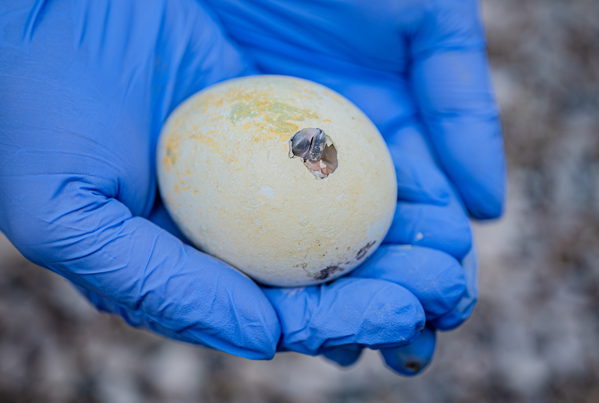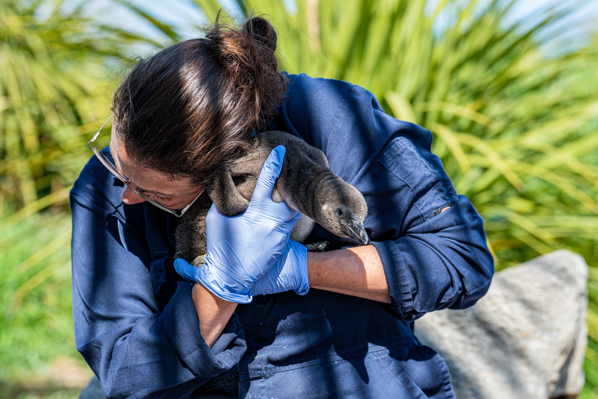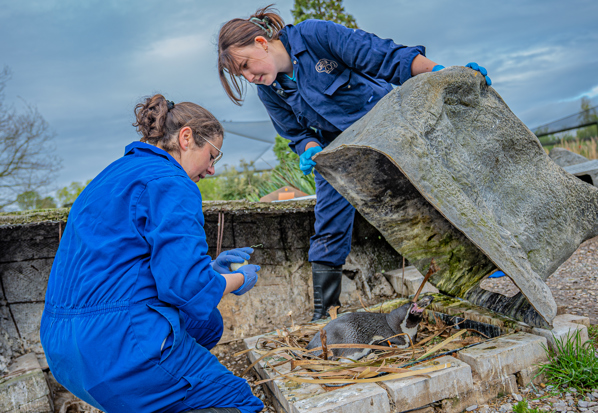
We're celebrating the hatching of TEN rare penguin chicks!
The chicks began hatching from their eggs between 16 – 28 April 2025 and have spent their first few weeks of life tucked away in their nest burrows.
Out of this world! Ten rare Humboldt penguin chicks hatch at Chester Zoo and are named after constellations and celestial wonders.
The rare new arrivals are highly threatened Humboldt penguins – one of the most at risk out of the world’s 17 species of penguin. The chicks began hatching from their eggs between 16 – 28 April 2025 and have spent their first few weeks of life tucked away in their nest burrows.

With penguins, both mum and dad share feeding and parenting duties. Keepers support the parents by providing plenty of extra fish, which the adult penguins swallow, blend into a protein-rich soup and then regurgitate to feed the chicks. Each new arrival is also weighed and has their airways checked regularly to help monitor their development - often tripling or even quadrupling in size in just a few weeks.
In a heart-warming development, one of the chicks is being raised by a same-sex penguin couple, Scampi and Flounder. The devoted duo stepped in to help raise one of two eggs laid by another penguin pair, Wotsit and Peach. The zoo’s bird experts carefully shared the eggs between the two nests to help give both chicks the best possible start and help improve chances of successful fledging.
Ten chicks hatching in one season marks a bumper year for the penguins here. It’s fantastic news for the species and a brilliant success for the international conservation breeding programme. The fluffy new arrivals are all being looked after brilliantly by their parents, having nearly quadrupled in size since they first emerged!
Zoe Sweetman, Team Manager of Penguins
Zoe continued:
"They’re now days away from a really exciting milestone - their very first swimming lessons, which is always a thrill to witness as they dive into the pool for the very first time.

"In what has been one of our long standing traditions, each year we pick a fun theme to help name our chicks, which helps us keep track of who is who now that there are 63 penguins in the colony. This year we’ve gone with a celestial theme for naming the chicks and we’ve had a lot of fun coming up with names inspired by stars, constellations and cosmic wonders. But we’ve saved the final two names for the public, who can help us choose via the zoo’s social media channels.”

Humboldt penguins are listed as vulnerable to extinction by the International Union for the Conservation of Nature (IUCN). Found on the rocky coastal shores of Peru and Chile, they face a number of threats in the wild, including climate change, overfishing and rising ocean temperatures. These factors are reducing the availability of fish and forcing the penguins to travel further from their nests to find food, which increases the risk of survival to both adults and their chicks.
The penguin colony at Chester Zoo plays a vital role in the international breeding programme for the species, helping to maintain a genetically healthy population in conservation zoos across Europe.
Humboldt penguin facts
· Scientific name: Spheniscus humboldti
· This South American penguin is named after the chilly Humboldt current, along which the penguins commonly swim.
· Of the world’s 17 penguin species, Humboldts are among the most at risk, with the species classed as vulnerable to extinction by the International Union for the Conservation of Nature (IUCN).
· In the wild, Humboldt penguins are vulnerable to disturbances in their food chain caused by strong El Nino currents.
· Humboldt penguins are social animals, living in relatively large colonies of closely spaced burrows.
· Humboldt penguins ‘fly’ through the water at speeds of up to 25mph.
· They enjoy a diet of small fish (anchovies, herring, smelt) and crustaceans.


